Blackwell Plasterers: Whether you are wanting to have your entire property in Blackwell plastered, just one room re-skimmed, or simply one small section of plaster repaired, you will be hunting for a seasoned and professional plasterer to carry out the work correctly. Unless you are really confident, plastering is not something you should attempt by yourself, mastering this craft takes years of practise.
Some plastering work is usually needed, even on the smallest of home renovation jobs. Usually it will be plaster skimming a dry lined partition, applying some screeding, rendering a patched up wall or installing cornices or coving before decorating. Don't imagine however that these are the only plastering and screeding jobs which might be required, as there are certainly many more possibilities.
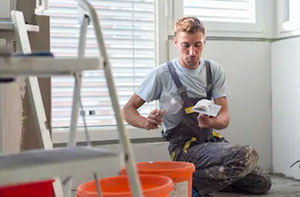
Now there are lots of Blackwell plasterers to pick from, and you must identify one that knows their trade. If they've got a website you'll be able to study pictures that they've posted, alternatively you could ask to have a look at a portfolio. You want to avoid using "cowboys" for this sort of work, without exceptions. Even inferior plastering can sometimes look tolerable at first, but later on, the problems start.
The imperfections will immediately show up on the freshly plastered wall once a coat of paint has been applied to it. And even more so, with the sun shining onto the newly plastered surfaces. So, be sure you only consider experienced plasterers in Blackwell.
It is always important to remember that plastering has to be level and smooth, considering that it's simply a base on which other materials are applied. It's fairly easy to fill and repair any negligible cracking and dents, but it's tricky to disguise fundamentally uneven surfaces. An imperfectly plastered surface will cause severe difficulties with bathroom or kitchen tiling, the wallpapering and painting of walls and ceilings, the fitting of skirting boards and the fitting of kitchen units.
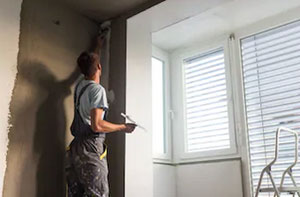
You can always tell the busiest Blackwell plasterers because they invariably get a polished finish, directly from the trowel. Ceilings and walls that have been plastered by an expert, should never need to be sanded down. If the plastering has not been done correctly, strenuous sanding may be required, and calls the plasterers ability into question. The alarm bells should certainly be ringing out if electric sanding machines are being used with any frequency.
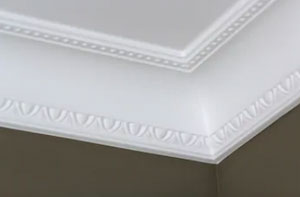
One of the most regular tasks for plasterers these days, is plastering over old artex ceilings. There are still hundreds of ceilings in Blackwell that are decorated with this once popular finish. Most plasterers in Blackwell will jump at the chance to plaster over that old artexed ceiling, making it look more fresh and modern. If you are more retro in your taste, you might wish to give your currently smooth ceilings some character by actually putting on artex.
Do-it-Yourself Plastering Blackwell: While it's generally better to bring in a professional plasterer in Blackwell when you've got plastering work that should be undertaken in your property, it is quite possible to have a shot at plastering yourself if you are fairly good at DIY, and have the self-belief to try. Practicing on a spare bedroom or an out of sight area is certainly advisable when you are starting your initial plastering adventure. When possible try to choose an area that's already got an inaccurately plastered surface, so your amateurish efforts can hardly make it much worse. This will be a lot less stressful for you, and allow you to spend some time trying out your newly found skills. You will very likely make a bit of a mess of it on the first couple of attempts, but you don't have to fret because it's possible to skim a wall surface as many times as you want.

If you are looking for some tips and hints to help you on your way, you might consider watching some YouTube video tutorials. Or, if you're really eager to learn plastering you could even look into signing up for a course at a local college or school. Plastering is of course "hands on" activity and the more you practice the more skillful you get. Sticking to the time-tested techniques is usually better when you're plastering, although through trial and error you might even come up with your own solutions for getting a flawless plastered finish. Since plastering is all about confidence, the more often you do it, the more confident you'll become. You will be able to start plastering the other walls of your home as soon as you have mastered the art to a level you're satisfied with. If the whole thing goes awry and you make a mess of the plastering, you can always hire a professional plasterer to correct your errors.
Pebble Dash
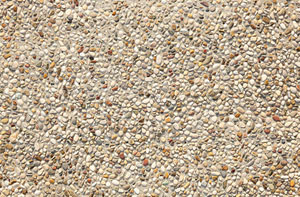
Pebble Dashing Blackwell: Pebble dashing (or roughcast) has been used for many years to decorate and protect the outside walls of homes. Although in Blackwell it isn't loved by everyone. Blackwell plasterers will often do this sort of task for you, although there are pebble dashing experts working in the area.
Pebble dashing (or pebbledashing) is a form of external wall covering that normally consists of 2 layers of a base made of lime and sand onto which small pebbles, gravel or shells are pressed to create a maintenance free, decorative and strong finish on both refurbished and new buildings.
Screeding Blackwell
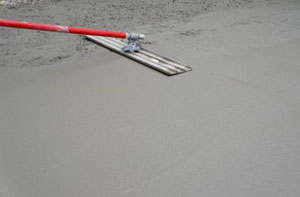
Screeding Blackwell: Screeding involves the spreading of a cement and sand mix, to make a smooth and flat floor surface. Generally screeding is poured on top of a concrete sub-floor to encase underfloor heating pipes, to take on the final floor finish or to be used as a finished hardwearing floor surface. A correctly laid screed can significantly extend the lifespan of a floor and ensure its finish, durability and quality. Screed should only be mixed by hand when small areas of flooring are involved. For larger projects, a decent screed pump needs to be used to produce a smooth and even mixture of sand, cement and water, which can then be pumped directly to the desired location. There are a number of different types of floor screeding available in Blackwell, therefore you need to ask around about which is appropriate for your project, you'll need to pick from structural screed, fast drying screed, traditional screed, floor levelling compound, unbonded screed, free-flowing screed and bonded screed.
Plastering Courses Blackwell

Plastering Courses Blackwell: The easiest way to either master the basics of the art of plastering or to gain the required knowledge and skills to begin a career in plastering is to register for a plastering course at a college or training centre. There are actually a multitude of plastering courses on offer for both existing tradespeople wanting to develop their plastering skills and for complete beginners. Both City & Guilds and NVQ level courses are available to both intermediate and beginner plasterers. Beginners plastering courses (level 1) tackle stuff like applying scratch coats (to walls), mixing up plaster products, fixing sheet materials, putting on set coats (wall surfaces), applying floating coats (walls) and making ready background surfaces. Advanced (Level Two courses) cover things like reverse moulds for fibrous work, fibrous plastering, plastering to exterior surfaces, sand and cement screed laying and dry lining. For plastering courses in Blackwell and around Derbyshire, do a quick search on Yahoo or Google. You can learn about five day intensive plastering courses HERE.
Exactly What is Plaster?
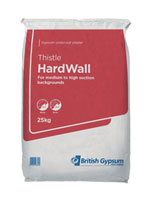
What is Plaster? - Employed for decorating and protecting walls and ceilings in buildings, plaster is a material which has been used since the times of the Egyptians. What most of us call "plaster" in Blackwell is normally thought of as the material that's used for coating the interior rooms of buildings and houses, whilst that which is used externally is known as "render" or "rendering". The plaster blend itself can contain different compounds but most frequently comprise of either lime, cement, or gypsum. All these mixes basically work in the same way, but have different uses. A fine, dry powder at the time of manufacture, when needed plaster is combined with water to make a stiff but easily workable paste. The reaction between the water and plaster produces heat through crystallization and the mix subsequently becomes hard.
Decorative Plastering
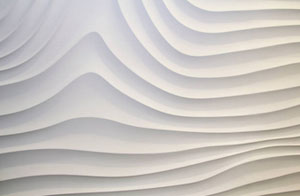
Plastering is certainly not a modern invention and was being implemented by the ancient Egyptians, Greeks and Romans in the far distant past. The substances used would of course have been different in those long forgotten days, when blends of mud and clay were employed. In 13th Century London, a form of plaster was placed on the internal walls of houses and buildings to help restrict fires from spreading. In the Victorian and Georgian eras great steps were made to create decorative mouldings and features out of gypsum, as you'll notice whenever you visit buildings from this time period. Gifted plasterers working today are able to produce breathtaking decorative effects by combining modern day materials with centuries old methods. Such decoration take countless forms and may incorporate the installation of brackets, cornice finishes, coving, corbels, ceiling roses, dentils and niches.
Artex
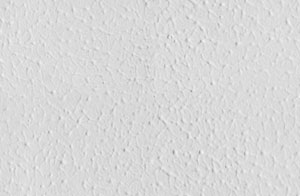
Artexing Blackwell: Especially popular throughout the 70's and 80's, artex has long been an effective way to add an ornamental finish to a ceiling, and also to cover over uneven surfaces and cracks. In the past, there were so many tradespeople carrying out artexing that it was easy to find somebody providing this kind of service in Blackwell. Nowadays however, finding a plasterer who does artexing is not quite so straightforward. No doubt the large variety of designs and styles was what made it so widely loved, and everyone seemed to have their particular favourite, be it bark, medusa, broken leather, criss-cross, circle, basket weave, pairs, scroll, hook & line, stippled or swirl. No matter what your taste, you'd find a style of artex to match. All of these artex styles can still be achieved today if you are able to track down a local plumber or artexer willing to do it. Stay away from "handyman" types who offer to "have a go". The main drawback of artex, and one that brought about its decline, is that it's difficult to patch or repair. (Tags: Artex Removal Blackwell, Artex Repairs Blackwell, Artexing Blackwell, Artex Blackwell, Artex Patching Blackwell)
Blackwell Plaster Patching
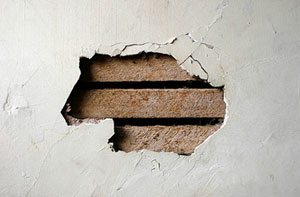
Damaged or cracked plaster is a regular problem, particularly with older properties in Blackwell or those which have recently been through building work or home improvements. Since the plaster is a vital part of your wall's surface, you have to keep it in good condition so that it can be effectively decorated and kept neat and tidy. There is nothing worse than having cracked plasterwork, or parts that are untidy or thoughtlessly filled with Polyfilla. So you can conclude your decorating and have your plaster walls looking pristine once more, you should bring in a reliable Blackwell plasterer who'll get your walls looking good again in double quick time. Your plastered walls can be impacted by a number of different issues, with accidental damage, vibration, shrinking, settlement and dampness being among the more commonplace causes. There's not much point patching these areas before sorting out any underlying problems, if you don't there will probably be a reccurence of the issue. (Tags: Plastering Repair Blackwell, Plaster Repairs Blackwell, Patching Plaster, Plaster Patching Blackwell)
Dry Lining (Plasterboarding)
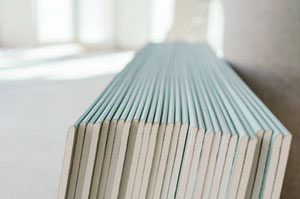
Dry Lining Blackwell: Some plasterers in Blackwell also offer dry lining services (plasterboarding), which are required in plenty of home improvement projects. Dry lining is the procedure where plasterboard is mounted on a wood studding, a metal frame or a brick or masonry surface to create a wall surface that doesn't have to be plastered. While it is feasible to decorate the plasterboard surface itself, generally most people opt to get the plasterboard skimmed with a fine plaster coat afterwards to give it a smoother and harder finish. In terms of fittings, when fixing to a metal frame Jack-Point self drilling, self tapping screws are used, when fixing to a brickwork wall the "dot and dab" method is used and when attaching plasterboard to timber studding or joists, drywall screws or nails are used. (Tags: Plasterboarding Blackwell, Dry Liners Blackwell, Dry Lining Blackwell)
Plasterer Blackwell
A craftsman who exclusively works with plaster, a plasterer in Blackwell is a specialist who carefully spreads a smooth, even layer of mixed plaster over previously rough and uneven surfaces, which can then be decorated. Plastering as a trade has been in existence for hundreds of years, while the technique in general has been employed in the finishing and repair of buildings for millennia. In today's world, mainly applied to the inside of the outside walls of commercial and residential premises, plaster is used to create a smooth, even surface that's ready to accept the final finishing material. It is also frequently used to make ornamental moldings over the ceiling and other sections of the wall. Also commonly used in the construction of loft conversions, extensions, garages and porches, the plastering process plays a crucial role in numerous home improvement projects in Blackwell.
Plastering Tasks Blackwell

Blackwell plastering specialists can generally help you with ceramic tiling, chamois plaster Blackwell, plaster patching, polished plastering, lay in grid suspended ceilings, dry lining and skimming ceilings, lath and plaster ceilings, repairs to coving, asbestos testing, drywall jointing Blackwell, stucco plaster, cornices and ceiling roses in Blackwell, rapid setting screeds, damaged plaster repairs Blackwell, the rendering of concrete blocks, magnetic plaster, plaster removal, blown plaster, ceiling replacements, repairing holes in ceilings and walls in Blackwell, Venetian polish plaster, floor levelling and screeding Blackwell, concrete plastering, pebble dash restoration, dot and dab walling, skirting board installation Blackwell, ceiling crack repairs, artex broken leather patterns, metal studding partitioning, monocouche rendering and other plastering work in Blackwell, Derbyshire.
Blackwell Plastering Services
- Blackwell Plaster Skimming
- Blackwell Floor Screeding
- Blackwell Coving Installation
- Blackwell Ceiling Replacements
- Blackwell Plastering Courses
- Blackwell Soundproofing
- Blackwell Plasterers
- Blackwell Plaster Patching
- Blackwell Plaster Overskimming
- Blackwell Partitioning
- Blackwell Internal Rendering
- Blackwell Plaster Repairs
- Blackwell Artexing
- Blackwell Plasterer
Other Useful Trades in Blackwell Derbyshire

Obviously, whenever you're doing home improvements and repairs in Blackwell, Derbyshire, you'll likely be in need of all types of different tradesmen and as well as plasterers in Blackwell, Derbyshire, you may also need rubbish removal in Blackwell, pebble dashing in Blackwell, plasterboard installation in Blackwell, artexers in Blackwell, plaster mouldings in Blackwell, internal rendering in Blackwell, painters & decorators in Blackwell, wall tiling in Blackwell, domestic cleaners in Blackwell, coving installers in Blackwell, screeding in Blackwell, dry lining in Blackwell, building contactors in Blackwell, carpenters in Blackwell, bricklaying in Blackwell, external wall insulation in Blackwell, polished plaster in Blackwell or electricians in Blackwell.
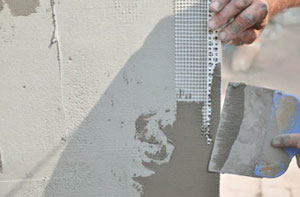 Plasterers Blackwell
Plasterers Blackwell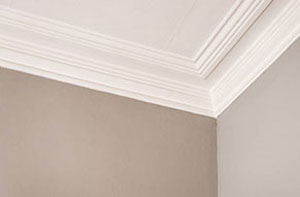 Plastering Near Me
Plastering Near Me Plasterer Blackwell
Plasterer BlackwellMore Derbyshire plasterers: Shirebrook Plasterers, Buxton Plasterers, Matlock Plasterers, Chesterfield Plasterers, Chapel En Le Frith Plasterers, Killamarsh Plasterers, Eckington Plasterers, New Mills Plasterers, Swadlincote Plasterers, Dronfield Plasterers, Ripley Plasterers, Ilkeston Plasterers, Belper Plasterers, Long Eaton Plasterers, Glossop Plasterers, South Normanton Plasterers, Staveley Plasterers, Somercotes Plasterers, Sandiacre Plasterers, Derby Plasterers, Brimington Plasterers and Heanor Plasterers.
Plasterer Blackwell - Decorative Plastering Blackwell - Plastering Blackwell - Plasterers Blackwell - Polished Plaster Blackwell - Cheap Plasterer Blackwell - Plasterboarding Blackwell - Artexing Blackwell - Screeding Blackwell





